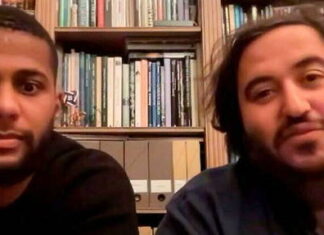Iceland face France, already qualified for the quarter-finals and assured of finishing at the top of Group D, this Monday evening at 9 p.m., on the occasion of the last day of the group stages of the Women’s Euro 2022. It is the third meeting at this stage of the competition between the two teams in the last four European tournaments.
The Icelandic star and captain, Sara Björk Gunnarsdóttir, took part in each of them and is now one of the footballing mothers, honored like never before during this edition where Iceland totals five, a record for all selections. confused. The ex-Lyonnaise, who has just signed a two-year contract with Juventus, is the youngest mother of “Dóttir”, “daughter” in the local dialect and surname suffix that most Icelanders associate with the first name of their father, their mother or both.
I really want to prove that you can come back from pregnancy and play at the highest level.
“Physically, it was obviously a challenge”, she confided shortly before giving birth to the American magazine Forbes. The most capped in the history of the selection of the North Atlantic island (141 games) has kept in shape throughout her pregnancy in order to prepare for her return to the club and especially to the selection for the fourth European tournament in a row in which Iceland participates. “Building a family by playing professional sports is difficult. I really want to prove that you can come back from pregnancy and play at the highest level,” the 31-year-old midfielder tweeted in early October with the goal of playing in the Euros.
It’s not either or. Starting a family when playing a professional sport is difficult. I really want to prove that you can come back from pregnancy and play at the top level… https://t.co/q09BIhGOtm
To stay in shape throughout her pregnancy, Sara Björk Gunnarsdóttir followed physical training for several months with a specialized coach in Iceland and continued with similar exercises in Lyon to prepare for her return. “I had my doubts,” the Icelander admitted in a BBC interview. “It’s my first time getting pregnant and I don’t know my body that way. I fractured my anterior cruciate ligament and then I had another injury, we know the stages, how we’re going to feel, but with pregnancy, we don’t know how your body will react. »
In March, four months after the birth of her son Ragnar Frank, the Icelandic number 7 was in good enough shape to return to the field and come into play for 45 minutes in Dijon in D1 women. His first tenure came with the national team during the last pre-Euro preparation match against Poland at the end of June (3-1) before being lined up against Belgium (1-1) and the Italy (1-1).
The public support of Olympique Lyonnais, his club at the time, is an example of the change in mentalities that sport brings about. The club had indicated in a press release that it was doing “everything” to organize the return of its player “in the best conditions”.
Another important step is the introduction by FIFA a year and a half ago of a regulation aimed at protecting women who become pregnant, including a compulsory maternity leave of 14 weeks paid at least two-thirds of their salary with obligation for clubs to reinstate their players after their pregnancy.
If life away from the lawns was trying for Sara Björk Gunnarsdóttir, often lonely to raise her son in his first steps – her husband Árni Vilhjálmsson, midfielder in Rodez (Ligue 2), could only come back a few days a week – she was worth it. “It’s difficult, the hardest thing I’ve done, but at the same time I love it, it’s the most incredible feeling [to be a mom, editor’s note] in the world”, testifies the Icelandic .


















